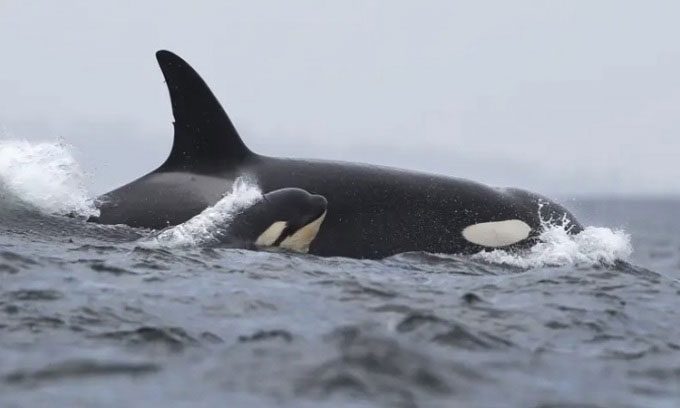Scientists believe that a female orca that was previously injured initiated the behavior of attacking boats and led smaller individuals to mimic her actions.
Orcas Attack and Sink Yacht off the coast of Iberia, Europe. Experts suggest that this behavior has been learned by other members of the population. Three orcas (Orcinus orca), crashed into a yacht on the night of May 4th in the Strait of Gibraltar, Spain, damaging the rudder. “There were two smaller orcas and one larger one,” reported Captain Werner Schaufelberger. “The smaller orcas targeted the rudder at the back while the larger individual continuously rammed the side of the boat.” Schaufelberger noted that he saw the smaller orcas imitating the larger one. They closely observed the techniques of their kin and also crashed into the vessel.

Female orca teaching younger one to target the rudder. (Photo: Chase Dekker).
The Spanish Coast Guard rescued the crew and towed the boat to Barbate, but the vessel sank at the port entrance. Two days earlier, a pod of six orcas attacked another sailing boat passing through the strait. Greg Blackburn, a sailor on board, observed that the mother orca seemed to be teaching her young how to target the rudder.
Reports of encounters with orcas along the Iberian coast began in May 2020 and have become increasingly frequent, according to research published in June 2022 in the journal Marine Mammal Science. The attacks primarily target sailing boats and follow a clear pattern. The orcas approach from the stern to attack the rudder and lose interest once they successfully stop the vessel from moving. This interactive behavior has been ongoing since 2020 in areas where orcas reside, both in Galicia and Gibraltar, according to Alfredo López Fernandez, a biologist at the University of Aveiro in Portugal and a representative of the Atlantic Orca Working Group.
Most encounters have been harmless. Of more than 500 recorded interactions since 2020, only three resulted in sinking. The surge in aggressive behavior towards boats is a recent phenomenon. The research team believes that a distressing event may have triggered a behavioral change in orcas, and other individuals in the population are learning to mimic these actions. Experts suspect that an orca named White Gladis may have experienced a painful moment, possibly a collision with a boat or being trapped due to illegal fishing, leading to this behavioral shift. She is the individual that started the direct contact behavior with vessels.
Orcas are highly social animals, capable of easily learning and mimicking the behaviors of others, according to research from 2022. In most cases, orcas follow each other to the boat’s rudder to bite, bend, or break that component. They seem to perceive this behavior as beneficial, despite the risks involved in crashing into a moving structure. Since the unusual interactions began in 2020, four orcas from the small population living in the Iberian waters have died, although their deaths were not directly related to collisions with boats.
The unusual behavior of the orcas may also be playful. They are incredibly curious and enjoy playing. Therefore, these interactions may resemble a game rather than aggressive behavior, according to Deborah Giles, a researcher on orcas at the University of Washington and the nonprofit organization Wild Orca.
Due to the increasing number of accidents, experts are becoming more concerned about the safety of sailors and the orca population in Iberia. A survey conducted in 2011 recorded only 39 Iberian orcas. “If the situation continues or worsens, it will pose a real threat to the safety of mariners and the conservation of the endangered orca species,” the research team stated.


















































